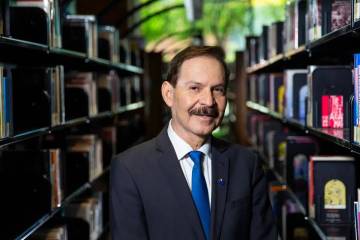Individuals, businesses with financial stakes in school district contribute to board members’ reelection
Individuals and businesses with financial stakes in the Clark County School District have poured thousands of dollars into the campaign war chests of the four Clark County School Board members seeking reelection this year.
The incumbents reported raising $17,750 in such contributions as of June 10, according to a Review-Journal analysis of campaign finance reports filed prior to Tuesday’s primary election. That’s no small change in local education races that typically draw little attention — from voters or donors.
While those contributions raise questions over the potential influence each donor wields over the board’s recent and upcoming votes on lucrative contracts, the trustees are at least one step removed from the direct conflict of interest that two other candidates may face should voters usher them into office.
Adam Johnson and Tim Hughes are running for the local and state education boards, respectively. They also work for organizations that receive taxpayer money approved by those panels.
“Well, this is Nevada,” said David Damore, a political science professor at UNLV who specializes in campaigns and elections.
“The interested parties and people who care about this stuff are the ones who have interest before these bodies,” he said. “Nevada’s just a really small group of people when it comes to the (elected officials) and people who fund them.”
As for the sitting trustees, the Nevada Commission on Ethics does not require public officers to disclose previously reported campaign contributions.
Still, Damore said even the perception of conflict of interest could make a difference to voters.
“If I’m a voter, I would want to know who’s funding these people,” he said. “Perception is big.”
THE INCUMBENTS
The only incumbent not facing a primary election Tuesday, District E Trustee Patrice Tew reported a $3,000 contribution from KAG Property LLC. The Skye Canyon developer last year donated several acres of land to the district for future use as a school site.
Real estate developers often reserve land for schools and offer it free or at a deep discount, with the hope that new schools will attract residents to buy homes in the surrounding neighborhoods.
“I’m exceedingly careful of not allowing myself to get into a conflict of interest,” Tew said. “I never make promises to donors, except to do what’s in the best interest of students.
“When I look at that, it’s not even a convoluted conflict of interest,” she added. “They’re not a vendor. They’re not seeking a contract (or) form of payment.”
In Districts A and B, Trustees Deanna Wright and Chris Garvey have banked a combined $13,500 from construction and architecture firms currently working on multimillion-dollar projects as part of the district’s 1998 and 2015 building plans.
Core Construction, for example, contributed $2,000 to Garvey’s campaign in August and $1,500 to Wright’s campaign in April.
That firm in December also won a $14.7 million bid to work as general contractor on the second phase of replacement buildings for Boulder City High School. And its contract heads back to the board on Thursday for approval of a $300,000 amendment to replace a chiller there.
Between April and May, board president Linda Young, who represents District C, collected $1,250 in two contributions from the wife of community activist Robert Green. He accepted a $5,000 monthly consulting fee from Camelot Education, which in November secured a $2.6 million contract with the district after Green lobbied Young and the board to approve it.
“Every decision I make or vote I cast is in the best interest of the students,” Young said in a statement Friday.
“I am proud to have the support and confidence from others, and all contributions are made public and above board,” she added. “I am proud of the success (the district) has had under my leadership.”
EMPLOYER INTERESTS
Johnson, who hopes to unseat Young, reported a $1,000 contribution on May 31 from Pugsley, Simpson and Coulter, an architecture firm working on an expansion of West Prep Academy and new elementary schools at Antelope Ridge and Galleria Drive and Dave Wood Circle.
He also already contacted his employer’s attorney to weigh any potential conflict of interest should he become a trustee.
Johnson works as a local director for Teach for America, a national nonprofit that the local board in 2014 awarded an up to $2.1 million contract to provide 525 teachers over three years. If he beats Young, Johnson said his role at the nonprofit would change in order to avoid a conflict of interest when the contract comes up for review.
“One of the things that would be effectively stripped from my roles and responsibilities (at Teach for America) are negotiations with the district,” Johnson said during a May interview.” There would be a clear firewall between my work with (the district) and my work with Teach for America.”
“The first hurdle is making it through the primary,” he added.
Damore said state lawmakers, who as citizens may work as teachers or doctors, often encounter similar issues when they vote on a bill impacting education or health care.
For public officials and employees, state law prohibits voting on matters that involve a gift or loan, their economic interest or the interest of a person with whom they have a private commitment. The ethics commission recommends disclosing that conflict of interest or disclosing it and abstaining from the vote altogether.
“The rule is basically just say and acknowledge it, and then do whatever you want,” Damore said.
Like Johnson, Hughes works for a national nonprofit with a public role. His employer, the New Teacher Project, recently won a nearly $1 million grant from the state board to help recruit elementary school teachers to Nevada.
The Nevada Department of Education last week opened a second application round for the grants, and Hughes noted the state board would approve those awards before, and if, he claims a seat on that panel.
Regardless, Hughes would sit on a board that holds grant recipients, including his own organization, accountable for how they use public funds.
“From my understanding, the oversight for those (grants) really comes in whether to continue funding those programs,” he said.
Contact Neal Morton at nmorton@reviewjournal.com or 702-383-0279. Find him on Twitter: @nealtmorton
Total money raised in 2016:
District A
Mallory Levins $21,626
Deanna Wright* $5,900
Richard Vaughan $3,555
Patricia Krajcech $1,900
James Gartside $0
Shawn Mueller $0
District B
Chris Garvey* $7,100
Jeff Eggeman $0
Carol McKenzie No report filed
District C
Adam Johnson $48,216
Linda Young* $15,903
Antonio Bowen $0
Mark Melton $0
Russell Davis $0
Walter Jones III No report filed
District E (on Nov. ballot)
Patrice Tew * $17,725
Lola Brooks $1,836
* incumbent
Source: Campaign finance reports filed with the Nevada Secretary of State





























